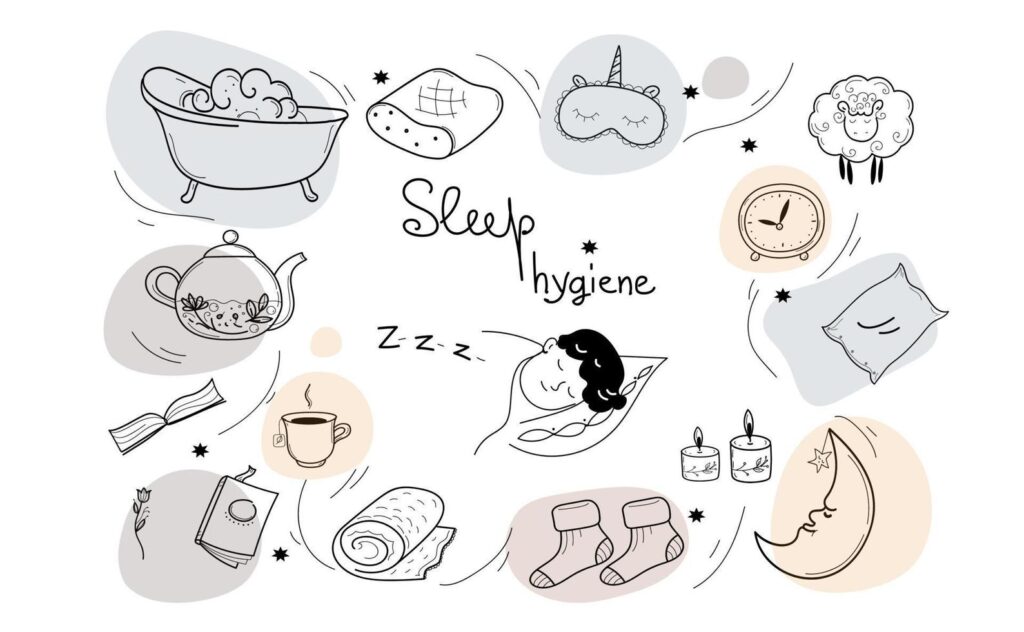Sleep Hygiene for Better Mental Health


“I’ll sleep when I’m dead!” ~ Warren Zevon
“No sleep till Brooklyn!” ~ The Beastie Boys
“A ruffled mind makes a restless pillow.” ~Charlotte Bronte
We all know that sleep is important for both our bodies and our brains, yet so few of us would say that we are satisfied with the amount and quality of sleep we get. In fact, many of you may have made New Year’s resolutions to get to bed earlier or to get more sleep. It is recommended that healthy adults get 7 to 9 hours of sleep a night. However, more than a third of adults report sleeping less than 7 hours a night. So many factors can impact our ability to get enough sleep: stress, worries, work and family obligations, over-scheduling, health complications, children who don’t sleep through the night, noisy neighbors, snoring partners, etc.
A more recent phenomenon known as “revenge sleep procrastination” may also be a factor. “Revenge sleep (or bedtime) procrastination” is when someone stays up later in the night than they mean to or know they should, in order to compensate for a lack of free time during the day, or the feeling that their time during the day is not their own. It can mean delaying going to bed, or delaying going to sleep once in bed, and usually takes the form of binge-watching, scrolling online, social media use, or other fairly mindless, time-sucking activities. While it may feel good or justified in the moment, we often regret it when the alarm goes off in the morning and we have missed out on crucial hours of sleep.
Having a partner who snores or maintains a different sleep schedule can also contribute to sleep loss. More and more couples are pursuing a “sleep divorce.” A sleep divorce, also sometimes called a “sleep separation” or “alternative sleep arrangements” is when a couple chooses to sleep separately from one another with the goal of better quality sleep. For some couples, this may mean two beds in one room (maybe one partner likes a firmer/softer bed, more or fewer blankets, or tosses and turns throughout the night). For others, it may mean sleeping in separate rooms (especially if one or both snores, they work different shifts requiring sleeping at different times; taking turns caring for an infant, etc). While there can be a social stigma associated with couples sleeping separately, the potential benefits of getting better quality sleep are leading more couples to try this arrangement out. Recent studies suggest that approximately 1 in every 5 couples are sleeping separately most or all of the time.
Loss of sleep can have significant immediate and long term effects.
Immediate consequences of sleep deprivation include:
- Grogginess, brain fog
- Impaired decision making
- Impaired reaction time
- Increased risk of accidents or injuries
Long-term consequences of chronic sleep loss include:
- Increased risk of hypertension, diabetes, obesity, depression, heart attack, and stroke
- Increased anxiety and depression
While certain medical conditions and sleep disorders such as sleep apnea, restless leg syndrome, narcolepsy, etc. that contribute to disrupted sleep require medical interventions, there are a number of behavioral and environmental changes that you can make to improve your sleep quality and quantity.
Good Sleep Habits to Start (and Maintain) in 2024
- Go to bed and wake as close to the same time each day as possible
- Avoid daytime naps if possible, and if you need a “power nap,” limit them to around 20 minutes
- Keep your bedroom as dark as possible
- Colder rooms promote better sleep (the ideal sleep temperature is between 60 and 67 degrees)
- Limit or avoid caffeine use in the afternoon and evening
- Exercise regularly, but not too late in the evening
- Limit your bedroom to sleep and intimacy
- Turn off screens (tv, computers, phones, tablets) 30-60 minutes before bedtime, and use the nighttime feature for evening screen usage
- Consider activities such as meditation, journaling, a gratitude practice, or light yoga/stretching as a pre-bedtime ritual to calm your mind
- Sleep on the best quality bed, pillows and bed linens you can afford
Can Therapy Help Me Sleep Better?
If, after making adjustments to your sleep habits, you find yourself struggling to get the amount and quality of sleep you need, it may be worth seeking professional help. Taking to your physician is important to rule out any medical concerns, but speaking with a therapist trained in behavioral medicine and CBTi (Cognitive Behavioral Therapy for Insomnia) is a good next step. Cognitive Behavioral Therapy for insomnia is typically a short-term therapy that can typically be completed in 6 to 8 sessions. Your therapist will meet with you to review your current sleep routine, sleep environment, and any mental health concerns. You will work together to adjust your sleep behaviors and to address any dysfunctional beliefs around sleep. Untreated or undertreated anxiety and mood disorders can often contribute to disrupted sleep, so addressing those concerns in therapy is also important.
If you’d like to meet with one of our professionals regarding sleep, contact our office at 248-220-3332.
Citations and Resources for Further Reading
The Centers for Disease Control, Sleep and Sleep Disorders: https://www.cdc.gov/sleep/data_statistics.html
The National Sleep Foundation: https://www.thensf.org/
Institute of Medicine (US) Committee on Sleep Medicine and Research; Colten HR, Altevogt BM, editors. Sleep Disorders and Sleep Deprivation: An Unmet Public Health Problem. Washington (DC): National Academies Press (US); 2006. 3, Extent and Health Consequences of Chronic Sleep Loss and Sleep Disorders. Available from: https://www.ncbi.nlm.nih.gov/books/NBK19961/
Liu, Y., Wheaton, A. G., Chapman, D. P., Cunningham, T. J., Lu, H., & Croft, J. B. (2016). Prevalence of healthy sleep duration among adults–United States, 2014. Morbidity and Mortality Weekly Report, 65(6), 137–141., Retrieved March 24, 2023, from https://pubmed.ncbi.nlm.nih.gov/26890214/
Walker J, Muench A, Perlis ML, Vargas I. Cognitive Behavioral Therapy for Insomnia (CBT-I): A Primer. Klin Spec Psihol. 2022;11(2):123-137. doi: 10.17759/cpse.2022110208. PMID: 36908717; PMCID: PMC10002474.
What Is “Revenge Bedtime Procrastination”? https://www.sleepfoundation.org/sleep-hygiene/revenge-bedtime-procrastination
“A ‘Sleep Divorce’ Might Be Exactly What Your Relationship Needs”

Recent Comments